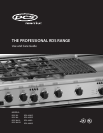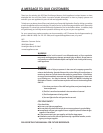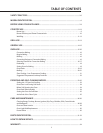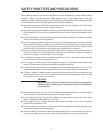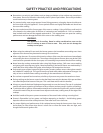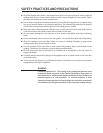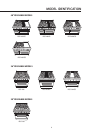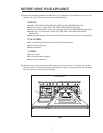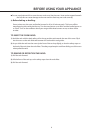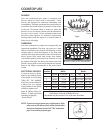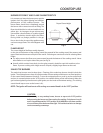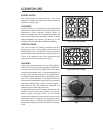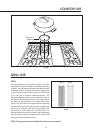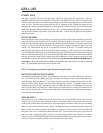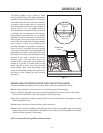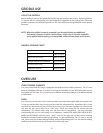
Clean the cooktop with caution. Avoid steam burns; do not use a wet sponge or cloth to clean the
cooktop while it is hot. Some cleaners produce noxious fumes if applied to a hot surface. Follow
directions provided by the cleaner manufacturer.
Be sure all the range and/or cooktop controls are turned off and the appliance is cool before using
any type of aerosol cleaner on or around the appliance. The chemical that produces the spraying
action could,in the presence of heat, ignite or cause metal parts to corrode.
Place oven racks in desired position while the oven is cool.If a rack must be moved while the oven
is hot, do not let the pot holders contact the hot interior of the oven.
Use care when opening the oven door; let hot air or steam escape before removing or replacing
foods.
Do not rub,damage,move or remove the door gasket. It is essential for a good seal during baking.
Clean the ventilator hood and filters above the range or cooktop frequently so grease from
cooking vapors does not accumulate on them.
Turn the ventilator OFF in case of fire or when intentionally “flaming”liquor or other spirits on the
cooktop. The blower, if in operation, could unsafely spread the flames.
DO NOT obstruct the flow of combustion or ventilation air to the appliance. Be sure a fresh air
supply is available.
For safety reasons and to avoid damage to the appliance never sit,stand,or lean on the oven door
or cooking surface.
Service should only be done by authorized technicians. Technicians must disconnect the power
supply before servicing this appliance.
WARNING:
California Proposition 65 - The burning of gas cooking fuel generates some
by-products which are known by the State of California to cause cancer or
reproductive harm. California law requires businesses to warn customers of
potential exposure to such substances. To minimize exposure to these
substances,always operate this unit according to the instructions contained in
this booklet and provide good ventilation to the room when cooking with gas.
SAFETY PRACTICES AND PRECAUTIONS
5



